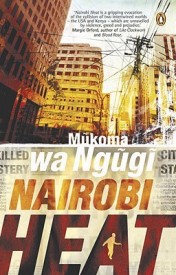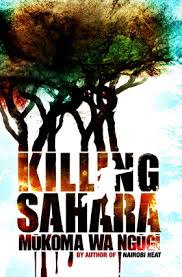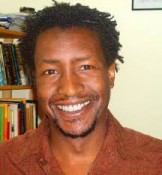The Africa Scene – with Mũkoma Wa Ngũgĩ
Mũkoma Wa Ngũgĩ is a thriller writer with roots in the US and Kenya. He’s also a poet, essayist, and professor of English at Cornell University. His columns have appeared in The Guardian, International Herald Tribune, and The Los Angeles Times. He’s been a guest on Democracy Now, Al Jazeera,and the BBC World Service, and his fiction has been shortlisted for the Caine Prize and for the Penguin Prize for African writing.
His latest thriller, KILLING SAHARA, starts as partners O (short for Tom Odhiambo—not Oprah!) and investigator Ishmael Fofona, originally from the US, are called to the scene of a murder of an American male in Kenya’s Ngong Forest. Shortly after the gruesome discovery of the body, a bomb explodes at the Kenyan Norfolk hotel: ten Americans die along with the fifty Kenyans. The cases are intertwined as the partners and friends pursue the culprits.
Please us a little about the first adventure in the series, NAIROBI HEAT.
In NAIROBI HEAT, Ishmael a black American cop is investigating the murder of a white young woman in Madison, Wisconsin. His main suspect is a Rwandan professor who teaches at the University of Wisconsin-Madison. In the course of his investigations he finds that he has to travel to Nairobi where there is a large Rwanda refugee community and teams up with Tom Odhiambo, a Kenyan detective whose conscience is subservient to getting the job done. It is in Kenya that he meets Muddy (Madeleine), a survivor of the Rwandan Genocide and ex-fighter in the Rwandan Patriotic Front, who tries to heal through spoken word poetry but whose first language is violence. I think in NAIROBI HEAT Ishmael is undertaking a journey of self-discovery in terms of his identity and at the same time coming unhinged as he relies more and more on violence.
KILLING SAHARA, a rollicking thriller, takes O, Ishmael, and Muddy from Nairobi to Tijuana to California and back again to Kenya. There’s plenty of action for thriller fans. But it’s certainly also a story of identity and explores the idea of the “place” we call “home.” Can you comment on that?
There are various levels of home and what it means. Muddy for example lives in Kenya effectively in exile—she has been away too long to go back to Rwanda and yet cannot be fully Kenyan. Ishmael on the other hand has come to terms with his blackness and his relationship to Africa as an African American. In fact he has claimed Kenya as his home but the more he settles in, the more he misses the United States in spite of the racism and classism that sets him apart. Thus in the end home to him is a paradox. O on the other hand is Kenyan but even then questions of ethnicity, and ethnic violence, keep challenging what being at home means.
Do Ishmael’s identity issues reflect your own?
In a way, I have used Ishmael to explore my own issues of identity. I was born in Evanston, Illinois to Kenyan parents and we went back to Kenya when I was few months old. Thus I grew up in Kenya, identifying as Kenyan until I came back to the United States in the 1990’s for college. After twenty years of being based in the United States, and realizing that my roots were growing here the longer I stayed I had to come to terms with the contradiction of growing roots in the United States while thinking of home as Kenya. I simply concluded, and I guess I really had no choice, that I have to claim both places as home. Certainly because of issues of racism in the United States, and ethnicity in Kenya, home is not a singular thing. To me “home” are the places I feel a need to fight in order to make them better.
What’s it like, teaching at an American University, when you have such roots in Kenya?
I feel rooted in both Kenya and the United States. To be rooted to me does not mean to be comfortable or even at home at one or multiple places—to me it means that I am willing to be part of both societies, or more aptly, to struggle to be part of both societies, to usefully challenge both societies. I see my teaching as part of that usefulness. But it works both ways—I have changed my views as a result of conversations with my students, who are also diverse in multiple ways. I love teaching and maybe I am still naïve to say this because it does by demand make me a perpetual student.
Do you have a preference as far as setting goes for your fiction?
Not really, I think most of the things I write tend to be set in both places. Even a novel on Ethiopian Tizita singers that is set in Kenya and Ethiopia has characters that have spent considerable amounts of time in the United States. I simply follow the demands of my imagination and the logic of what I am writing and because ultimately we write from what we know in order to get to what we do not know, the characters start from where I am and have been before moving on.
KILLING SAHARA is set pre-Obama days. The story reflects an underlying hope that the election of a black President might mean a more respectful attitude toward Africa. Can you comment on this?
I was intrigued by the way Africans claimed Obama as wholly African. Kenyans tended to see Obama as Kenyan to the extent that US elections seemed like a Kenyan affair—beers and children named after him. The president declared a public holiday after Obama won, and wisely so because people took to the streets during the day and to the bars at night to celebrate. No one was going to go work the following day. At the same time Americans, especially black Americans, were claiming him as American without any consideration to this Kenyan/African immediate ancestry. I thought it reflected a larger question of the relationships between Africans and African Americans, one of solidarity and great tensions and I wanted to explore that.
When O talks about the casualties after the bombing of the Norfolk Hotel, he says: “It’s funny how you Americans never count the African dead…” There does however, seem to be more of an international interest in and awareness of terrorism in Africa at the moment. What is your opinion?
I was thinking how when a bomb exploded in the US Embassy in 1999, all twelve American dead were named and their stories told. The Kenyan dead, 245 of them, have remained just a large faceless number. A little forgotten detail was how white bodies were assumed to be American and black bodies African. So a black American consulate worker ended up being taken to a Kenyan morgue as opposed to being shipped back to the US.
The war on terror as a global amorphous never ending war is largely an American creation. This was a response to the world trade center terrorist attacks but the response was to manufacture a war with Iraq. Kenya has jumped into the fray and sent soldiers into Somalia ostensibly to quell Al Shabab. But what a global war on terror does, is to give states permission to invade and kill.
Going back to Kenyan issues of ethnicity, during a conversation in KILLING SAHARA, O says to Ishmael: “You have laws and criminals on different sides…, what matters is getting the criminal, even when ethnicity and race run interference. In my mother’s world, one’s ethnicity matters more than life and death itself…” Can you comment on the ethnic fighting in Kenya then and now?
 Ethnicity has become a weapon in the hands of Kenyan and African politicians that they deploy when they need votes. This is in the same way race and ethnicity in the United States becomes politicized during elections or whenever there is something of national importance at stake. In Kenya during the 2007 elections, ethnic tensions were manipulated and fanned until they burst into violence. Following the post electoral violence of 2007, I think there is more awareness that violence and civil war are not far behind flaring ethnic tensions and there was more caution in how the media for example talked about the different ethnicities.
Ethnicity has become a weapon in the hands of Kenyan and African politicians that they deploy when they need votes. This is in the same way race and ethnicity in the United States becomes politicized during elections or whenever there is something of national importance at stake. In Kenya during the 2007 elections, ethnic tensions were manipulated and fanned until they burst into violence. Following the post electoral violence of 2007, I think there is more awareness that violence and civil war are not far behind flaring ethnic tensions and there was more caution in how the media for example talked about the different ethnicities.
But the real issue is that ethnic politics hide the gross inequalities in Kenya. For example, the current president and his family own 500,000 acres of land—that is half a million acres of land where there are millions who are landless and living in poverty. And yet he was able to use ethnic nationalism to win the elections in 2012.
The villain in KILLING SAHARA, he’s aptly named Sahara, is the leader of a group that has grand ideas on manipulating a New African Order. Can you comment on the concept behind the story?
I was thinking about the idea that one country can create democracy in another country through violence or manipulating that country’s internal politics. And just how dangerous this doctrine has been with Iraq being a prime example. I was also thinking about easy political change looks today—like you can just have a popular uprising that is spontaneous and from that democracy will rise. But look at Libya today where a popular uprising received enthusiastic support from NATO which is to say the United States, or Egypt where the military has taken control of the electoral politics. Political change I think is slow and organic. But for Sahara and his followers, political change can be abrupt, violent and even pre-emptive.
KILLING SAHARA also is a story of love and loss. O’s wife, Mary, is murdered early on in the tale, and O is driven by revenge to find her killer. As you’ve mentioned, Ishmael’s lover Muddy (Madeleine Muteteli), plays a major role. Please tell us a little more about the women.
With Muddy, I did not want her to be the femme fatale in the tradition of the American detective novel—where beautiful blonde women (think Raymond Chandler’s brilliant but flawed THE BIG SLEEP) use their sexuality to bend the men to their will. I wanted a main character who to my mind was more realistic—revolutionary to the extent of joining an armed struggle for freedom. I wanted to have a female character with the strength of the Kenyan women who were part of the armed struggle, for example, General Muthoni, against British colonialism. But at the same time flawed and conflicted and so Muddy tries to make sense of her world and herself through the spoken word. Deep down, with all things being equal—she is a poet. But one whose world has demanded that she first learn and become fluent in the language of violence. On the face of it, Mary, a schoolteacher who does her duty by society and is married to O, should not get along with Muddy, but they are drawn to each other because they share a strength and resilience in a society that is patriarchal and washes women out of history.
I’m drawn to the wealth and breadth of the stories we have to offer as Africans. Are American readers becoming more interested in African stories? Is the African thriller becoming more popular?
I think there is a growing interest in International popular fiction. For example both my novels are published by Melville Publishing under its international crime series. But I think African crime fiction has existed and will exist beyond Western aesthetic appetites and fashions. This is simply because cultures throw up writers who work through the pains, joys, and contradictions of that culture through telling a good story. African writers are trying to tell a good story that Americans are appreciating more and more, and appreciating its diversity and cross genre aesthetics—and that is a good thing.
What’s next on your agenda? More adventures for Ishmael and O?
What I have in the pipeline is as far as genres go something completely different. A novel tentatively called We Sing the Tizita to Bring Back Our Dead. This is a novel about music and musicians. The Tizita is pretty much like the Malian blues, or African American blues but also very different in that it’s a set of a few songs that the musician has to master and excel in, and accepted by his or her audience as a Tizita singer. So in the novel I have five Ethiopian musicians competing to see who can sing the best Tizita. Now, such a competition would not happen in real life because the Tizita is about carrying a people’s soul, a historical soul but that is the joy of fiction—to make a few transgressions to tell a story.
*****
 Joanne Hichens is an author, editor, blogger at News24, and creative writing teacher at Rhodes University. Her novel DIVINE JUSTICE, featuring PI Rae Valentine, was named a Top Ten KillerThriller by the Sunday Times and a Top Ten LitNet Read for 2011.The sequel, SWEET PARADISE, will be out in 2014. BLOODY SATISFIED, an anthology of South African crime-thriller fiction, edited by Joanne,has just been released by Mercury.
Joanne Hichens is an author, editor, blogger at News24, and creative writing teacher at Rhodes University. Her novel DIVINE JUSTICE, featuring PI Rae Valentine, was named a Top Ten KillerThriller by the Sunday Times and a Top Ten LitNet Read for 2011.The sequel, SWEET PARADISE, will be out in 2014. BLOODY SATISFIED, an anthology of South African crime-thriller fiction, edited by Joanne,has just been released by Mercury.
To learn more about Joanne, please visit her website.
Photography credit: Dieter Losskarn
- Africa Scene: Iris Mwanza by Michael Sears - December 16, 2024
- Late Checkout by Alan Orloff (VIDEO) - December 11, 2024
- Jack Stewart with Millie Naylor Hast (VIDEO) - December 11, 2024


